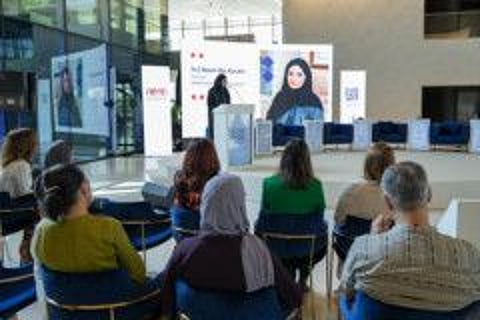UAE: More men in forums on women’s issues urged
NAMA’s ‘Connect with Irtiqa’ roundtable in Sharjah raises gender parity concerns

Sharjah: NAMA Women Advancement (NAMA) recently held its second ‘Connect with Irtiqa’ roundtable at the House of Wisdom in Sharjah to promote gender parity.
Titled ‘Women in the Workplace: Setting a Roadmap for Gender Equality’, the session welcomed over 50 attendees - high-level representatives from private companies, government and semi-government personnel, as well as a group of influencers including media personnel.
The event featured a panel discussion to explore effective strategies for women’s inclusion in the workplace. Moderated by Rima Farrage, Senior Producer and Presenter at Forbes Middle East, the discussion was led by top private sector executives, namely, Carlina Marani, Managing Director Growth Markets, Accenture Middle East; Nada Taryam, Managing Director, Civil and Architectural Projects, Bee’ah; Bedriya Alsaeed, Employee Engagement Manager, MBC Group; and Paula Newby, CEO, Predixa.
Recommendations
During the interactive session, several insights on the opportunities for advancing gender equality in the workplace were presented. The speakers delved into their own experiences and shared a number of learnings and recommendations, including: finding tangible solutions to shift the mark on the gender map; increased male representation in panels and forums addressing women issues, more self-awareness to uncovering biases; active listening to expand horizons for multiple point of views; finding like-minded personalities for enhanced discussions; researching and quantifying all available data; and, setting strategies to conceive the changes of time.
Reem BinKaram, director of NAMA, said: “According to the World Bank’s Women, Business and the Law 2022 report, around 2.4 billion women of working age are not afforded equal economic opportunity. At NAMA Women Advancement, we believe we can make a difference; we take meaningful action to bridge the gender divide that continues to affect our workplaces and economies. And needless to say, this cannot be achieved without support from the private sector, which occupies a giant share of the global workforce and economy.”
She added: “This is the reason why NAMA’s Itriqa initiative was launched in the first place... Regional and global efforts must come together to drastically address the systemic and underlying barriers that have been holding several generations of women back from realising their true potential, including at their places of work.”
Experts’ advice
During the panel discussion, Paula Newby, CEO, Predixa said: “To become the needle of change, aspects of gender equality and women’s empowerment need to be quantified with data, to showcase the improvements. Only then will you get the support of the leadership who will help the momentum to continue.”
Sharing her personal journey to nurturing a society of inclusion, Nada Taryam, Managing Director, Civil and Architectural Projects, Bee’ah said: “I was fortunate enough to receive support in the beginning of my career to progress and build confidence to become the person I am today. It is this kind of support that shifts the world to becoming a better place.”
Bedriya Alsaeed, Employee Engagement Manager, MBC Group said: “Culture is what we determine it to be, so let us collectively together bring out the best in others to make it the best culture we can have.”
Carlina Marani, Managing Director Growth Markets, Accenture Middle East, said more women need to take life into their own hands.
“Women need to make more tough decisions and have conversations surrounding their dreams and aspirations with their employers and partners. I believe that making ourselves clear will make it less difficult for making things happen.”



